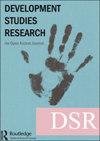儿童营养不良、消费增长、孕产妇保健和价格冲击:来自加纳北部的新证据
Q2 Social Sciences
引用次数: 10
摘要
儿童营养不良仍然是一个重要的全球健康问题。为了实施有效的政策来解决这一问题,首先了解营养不良的机制至关重要。本文使用来自加纳北部的独特数据集来解释儿童营养不良的潜在原因。它采用一种经验框架,根据儿童、家庭和社区特点对保健和营养生产方面的投入进行建模。研究结果表明,产妇机构和保健有助于改善健康状况。家庭资源——以消费的形式——与食物摄入和营养结果呈正相关。模拟表明,在这种情况下,收入增长、改善孕产妇保健和避免突然的价格冲击对减少营养不良有积极的作用,但效果相当有限。对两岁以下儿童的影响更大。因此,同时解决潜在决定因素并针对最年轻儿童群体的政策,可能对减少这一群体的营养不良产生最大影响。本文章由计算机程序翻译,如有差异,请以英文原文为准。
Child malnutrition, consumption growth, maternal care and price shocks: new evidence from Northern Ghana
ABSTRACT Childhood malnutrition remains a significant global health concern. In order to implement effective policies to address the issue, it is crucial to first understand the mechanisms underlying malnutrition. This paper uses a unique dataset from Northern Ghana to explain the underlying causes of childhood malnutrition. It adopts an empirical framework to model inputs in the production of health and nutrition, as a function of child, household and community characteristics. The findings suggest that maternal agency and health contribute to improved health status. Household resources – in the form of consumption – are positively associated with food intake and nutritional outcomes. Simulations show that income growth, improving maternal care and avoiding sudden price shocks have a positive – but rather limited effect – on the reduction of malnutrition in this context. Effects are greater in children under two. Hence, policies that address underlying determinants simultaneously, and target the youngest population of children, could have the largest effect on reducing malnutrition in this population.
求助全文
通过发布文献求助,成功后即可免费获取论文全文。
去求助
来源期刊

Development Studies Research
Social Sciences-Development
CiteScore
3.20
自引率
0.00%
发文量
20
审稿时长
12 weeks
期刊介绍:
Development Studies Research ( DSR) is a Routledge journal dedicated to furthering debates in development studies. The journal provides a valuable platform for academics and practitioners to present their research on development issues to as broad an audience as possible. All DSR papers are published Open Access. This ensures that anyone, anywhere can engage with the valuable work being carried out by the myriad of academics and practitioners engaged in development research. The readership of DSR demonstrates that our goal of reaching as broad an audience as possible is being achieved. Papers are accessed by over 140 countries, some reaching over 9,000 downloads. The importance of the journal to impact is thus critical and the significance of OA to development researchers, exponential. Since its 2014 launch, the journal has examined numerous development issues from across the globe, including indigenous struggles, aid effectiveness, small-scale farming for poverty reduction, sustainable entrepreneurship, agricultural development, climate risk and the ‘resource curse’. Every paper published in DSR is an emblem of scientific rigour, having been reviewed first by members of an esteemed Editorial Board, and then by expert academics in a rigorous review process. Every paper, from the one examining a post-Millennium Development Goals environment by one of its architects (see Vandermortele 2014), to ones using established academic theory to understand development-imposed change (see Heeks and Stanforth 2015), and the more policy-oriented papers that contribute valuable recommendations to policy-makers and practitioners (see DSR Editor’s Choice: Policy), reaches a multidisciplinary audience.
 求助内容:
求助内容: 应助结果提醒方式:
应助结果提醒方式:


